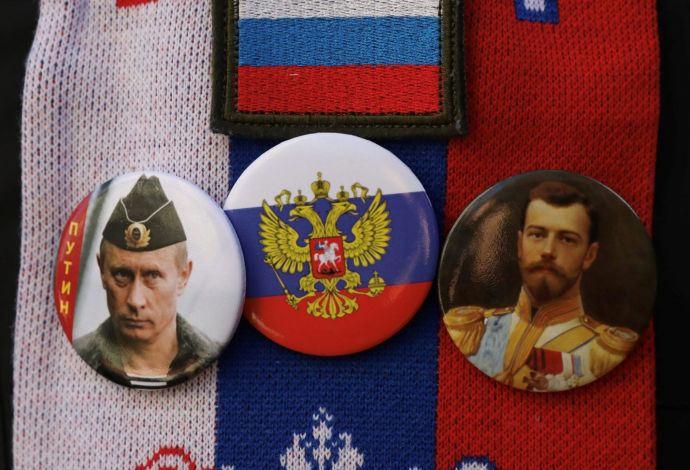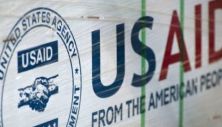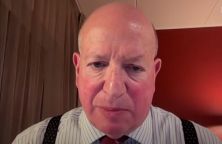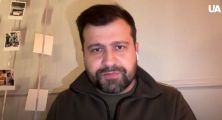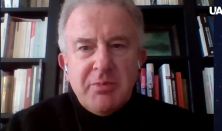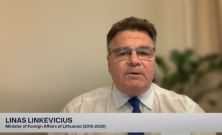The power and propaganda of an authoritarian state reaches its peak of insidiousness when a fierce critic and opponent of the regime can promote important messages of the regime’s ideology without even realizing it.
One such case was written by Tomasz Camusella in an article for New Eastern Europe, a professor in the modern history of Central and Eastern Europe at the University of St. Andrews in Scotland.
Camusella wrote about the famous writer Mikhail Shishkin. He is one of the few well-known Russians to voice strong opposition to Moscow’s ongoing invasion of Ukraine. Despite this, many of his words and actions still play into the hands of the Kremlin. Beginning in 2013, he turned into a vocal critic of authoritarian Russia and openly dubbed the country’s government a “criminal regime”. In 2022, the writer condemned Moscow’s unjustified and imperialist full-scale onslaught against peaceful Ukraine.
On the first anniversary of the Russian invasion of Ukraine, the writer published an open letter to his “Ukrainian Friend”. Assessing the situation one year after the outbreak of Russia’s war against Ukraine, Shishkin zooms in on culture. More specifically Russian culture. Dramatically, he opens the letter to his Ukrainian Friend by stating that the Kremlin “stole our language”. The proposition inches dangerously close to the main premise of Putin’s 2021 essay “On the Historical Unity of Russians and Ukrainians”. This argues that Ukrainians and Russians together with Belarusians were, are and should remain a single Russian people, bound by the same language, that is, Russian. In this imperialist formulation, Ukrainian and Belarusian are seen as mere regional or rural dialects of Russian, nevertheless being completely different languages.
In the conclusion of his letter, the anti-imperialist Shishkin believes that the way to a new democratic Russia is through “the amputation of the empire from the Russian man”. The proposal amounts to teaching Russia’s ethnically Russian citizens to appreciate their country’s multi-ethnic character, together with the diverse cultures of Russia’s tens of ethnically non-Russian indigenous peoples, such as the Buryats, Chechens, Sakhas, Tatars, or Tuvans.
It is 2.2% of those in reserve in the Republic of Kalmykia who were drafted as part of mobilization policy. Just so you understand, a total of only about 150,000 people live in the Republic of Kalmykia. Accordingly, simple math allows you to understand the scale of the tragedy. Of course, it is also necessary to take into account the small number of our people, – Daavr Donzhin, The Oirat-Kalmyk People’s Congress member
Despite the constitutional guarantees for Russia’s numerous indigenous nations, their rights are observed in breach. As we now well know, in percentage terms, more young men are mobilized for the war in Ukraine from the ethnically non-Russian nations than from among the ranks of ethnic Russians. Even worse, ethnically non-Russian conscripts are more likely to die in combat. Meanwhile, back home, their families and communities are pressed hard with administrative measures and financial sweeteners to abandon their languages in favour of Russian. As a result, Russification accelerates. In line with the ethnolinguistic ideology of the Russian world, the Kremlin seeks to overhaul multi-ethnic Russia into a homogenously Russophone Russia.
At present, Shishkin blames his true home country of Switzerland and the West in general for extending insufficient support to the fledgling Russian democracy during the 1990s. In his view, this fact “explains” why the democratic system failed in Russia, opening the way for the rise of a neo-Soviet totalitarianism. Yet, Shishkin’s admonishments sound hollow, because he did not divest from Russia, either. His books were published in Russia after 2014 and are still released in this country, following Russia’s attack on Ukraine last year. The writer’s latest collection of Russian-language essays was launched in Moscow in August 2022, or half a year after the Russian armies had invaded Ukraine.
If he deems it morally and politically wrong for a Swiss food-producing company to remain in today’s neo-imperialist Russia, the same is true of any Russian-language Swiss writer, who allows for his books to be published in this neo-imperialist and totalitarian country.
Rightly, Shishkin predicts a democratic future only for a decolonised Russia. This is a future Russia that eventually freed its colonies and transformed itself into a normal European country. But decolonisation alone is insufficient for achieving this goal. Russian cultural and linguistic imperialism must also end.
And if you think that only one Shishkin has such a position, you are deeply mistaken. Imperialist phrases, opinions or even articles can be found in many Russians who are considered oppositional. For example, Yulia Latynina always criticizes Putin, praises Ukraine and Zelensky, but the real goal is more like the fact that she wants to simply replace Putin with another dictator and to preserve the status quo. Here are just a few of her recent tweets.
Dislikes in relation to likes under posts about the law on serving subpoenas in leading patriotic and military channels. Few true patriots, only traitors, – Yulia Latynina, Russian writer and journalist on Twitter
That is, in Latinina’s opinion, a real patriot should go to the army on draft and fight for his country, killing people of another neighboring country. But yes, Latynina hints that the Western mass media can keep things quiet and say only what is beneficial to them.
Anyone who is surprised that The New York Times writes about the war in Ukraine should remember that in 1932 their journalist received the Pulitzer Prize for praising Stalin and denying the Holodomor, – Yulia Latynina, Russian writer and journalist on Twitter
How good it is that at that time, and for almost 60 years after that, there was a real newspaper Pravda on the territory of the USSR, where any text was proofread by a communist censor before publication. And should we mention now that the Swedes were the first to write about the accident at the Chornobyl nuclear power plant due to the increase in radiation levels. For all Soviet mass media, it was an ordinary fire.
Ambiguous phrases can also be found in another Russian, Viktor Shenderovych. Back in August, he wrote the article Self-reliance of a person. He tried with all his might to explain that Putin and Putin’s regime are at war with Ukraine, not Russians. But almost 200,000 Russians have already died in the war against Ukraine. And I did not hear huge protests against the war in Russia. On the contrary, when the head of the PMC “Wagner” Prigozhin, announced last week that the Ministry of Defense of Russia does not give shells, there were protests in Russia with the demand to give shells to Russian soldiers, and not to save their lives. So maybe the Russians are to blame, not Putin? Because I simply recommend you to read what ordinary Russians write when Russian rockets explode in Ukrainian cities. Read the reactions to Dnipro, Kherson or Uman.
And such Shenderovichs, Shishkins, Latinins, Kats will always find a reason why unknown Putins or Shoigu are to blame for the war, but they do not see in their actions or phrases that they are spreading imperial narratives.
This video is a must-watch for anyone interested in protecting their culture from new and old imperialism, presumably Russian.
Read also: Ukraine, Russia and WW2: ‘Never Again’ vs Victory Madness (VIDEO)

